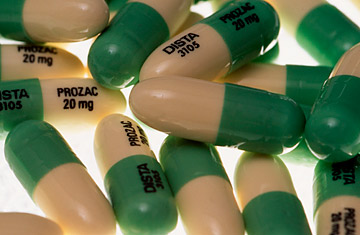
(3 of 3)
Predicting a Prozac Effect
In an earlier study that Hunter published in 2009, she and her team used the same QEEG technique on 58 patients, who were given a placebo daily for one week before being randomized to take either placebo or an active drug. Researchers found distinct patterns of brain activity in the patients; not everyone responded to the placebo the same way. "We found that changes in brain function occurring during the first week of placebo predicted who will do well on medication," she says.
The region where changes were recorded — in the prefrontal lobe — is thought to be involved in generating expectations. A common explanation for the placebo effect is that the mere anticipation of improvement begets real benefit. But in the case of Hunter's patients, the changes in brain activity predicted actual response to the antidepressant, not to placebo.
Intriguingly, in patients who showed the specific brain response associated with antidepressant-related recovery, the most significant improvement was seen in what psychologists call interpersonal sensitivity — how people respond to either positive or negative social events. When suffering from depression, patients tend to become inured to positive social cues and oversensitized to negative ones. They may interpret a passerby's frown as being directed at them, for instance, and some research has found that depressed people are more likely to misidentify smiling faces as conveying neutral or negative emotions. The patients who improved with medication in Hunter's study "were less sensitive to rejection and more comfortable with others," she says.
Reducing emotional sensitivity — not treating depression per se — is what medications like Prozac, which affect the levels of serotonin in the brain, do best, according to Healy. If that entire class of drugs had been studied and marketed as pills to reduce emotional reactivity rather than depression, he says, "the placebo response would be very small compared to the drug."
Still, treating a patient's oversensitivity does not necessarily help depression. For some people whose illness is marked by social dread and misperceived rejections, reducing that anxiety could be critical. But for someone whose depression is primarily experienced as deep sadness and inability to feel pleasure, blunting emotional sensitivity may do little good. These differences further explain why the drugs may produce such varied individual responses.
The Myth of Overmedication
As many as 50% of cases of depression will lift over time with no treatment, according to some studies — a fact that contributes to the persistent perception that antidepressants are overprescribed. Such data suggests that it makes sense to start with non-drug therapies like exercise and psychotherapy, at least to treat people with first-time mild or moderate depression and especially those whose sadness is directly caused by a recent setback or personal loss.
Indeed, a larger, less publicized study, which appeared in the Archives of General Psychiatry in the same month as the JAMA meta-analysis, suggests that the fear of overmedication may be more media obsession than reality. The research, which involved a survey of nearly 16,000 Americans in their homes, found that a bare majority of 51% whose symptoms qualified as major depression received any treatment at all. Among depressed patients, more received psychotherapy (44%) than medication (34%).
Troublingly, most people who sought help did not receive high-quality care. Among those surveyed, just 21% of those in psychotherapy received care consistent with medical guidelines for best practices; only 8% of those who took antidepressants received guideline-concordant care; and about one-third of patients who got combination therapy were given appropriate treatment. Poor treatment and no treatment were most common among Latinos and African Americans.
The real problem with mental health care in the U.S., then, is not that everyone is popping antidepressants, but that effective treatment is severely lacking for large swaths of the population. Certainly, some people have been prescribed medication unnecessarily, but the problem is dwarfed by that of patients who get no help at all. Evidence suggests that about 80% of people with depression can be helped by drugs, talk therapy or a combination of the two, so although it is critical to figure out which treatments work for which patients, the larger question remains: Why aren't most patients getting good care, and why do we continue to insist that so many of those taking antidepressants don't really need them?
